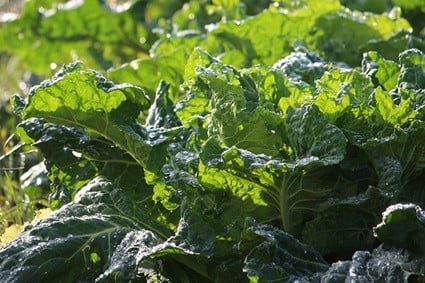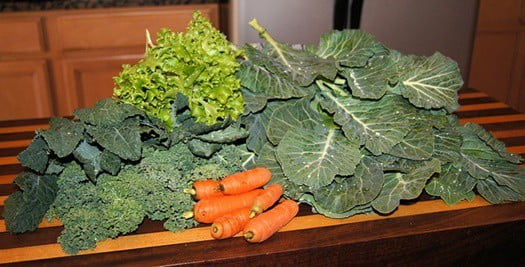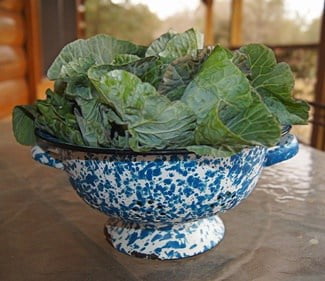Rabbits’ diets should mainly be comprised of hay, vegetables, small scoops of pellets, and the occasional fruit treat. Due to the wide variety of fruits and vegetables out there, it can be difficult for an owner to know which veggies are safe to feed rabbits and which ones to avoid.
Rabbits can eat collard greens as they are good sources of essential vitamins, minerals, and dietary fiber. However, rabbits can grow sick if they overindulge in vitamin-rich foods. Knowing how much collard greens to feed your rabbit is key. Additionally, you should only feed a rabbit fresh, raw vegetables to better preserve the nutrients.
Most rabbits will love the taste of this fresh, leafy vegetable. However, you should take care to introduce new vegetables into your rabbit’s diet slowly. Pet rabbits have sensitive digestive systems, so any imbalance can cause soft stools and other digestive problems.
What Are Collard Greens?
Collard greens are a dark, leafy cruciferous vegetable with a bitter taste. They are a popular vegetable in the southern U.S., northern Spain, East Africa, Southern and Eastern Europe, and Brazil. The University of Florida states that, despite the fact that this vegetable being a huge staple of southern U.S. cuisine, it is not commonly used or even well-known outside that region of the country.
Cruciferous vegetables like collard greens are a part of the Brassicaceae family of plants. Under this one genus are a plethora of different species, groups, and other cultivars (or variants) that are high in vitamin C and dietary fibers. Other vegetables that fall under this family include cabbage, kale, mustard greens, turnip greens, and plenty of other healthy green vegetables you may be more familiar with.
There are at least 12 variants of collard green that we know of, with 2 of those (the American and Carolina variants) being unavailable for commercial trade and consumption. The variant known as Green Glaze may still be available in some places, though many consider it to be undesirable due to its lighter-colored leaves and greasy appearance. Green Glaze is best suited as a worm repellant for the yard. You may find the rest of the variants sold in grocery stores, however. These variants include:
- Bulldog
- Champion
- Flash
- Georgia
- Hi Crop
- Morris Heading
- Tiger
- Top Bunch
- Vates
Collard greens typically have a hard stalk that can grow up to 4 feet in length and thick, tender leaves that bloom in a crown shape above it. Rabbits will typically favor the vegetable’s lush leaves over the harder stalk during meals.
This preference can be beneficial to their health. Darker-leaved vegetables in particular pack far more nutrients within their leaves than their water-filled stalks. According to Michigan State University, vegetables with darker leaves contain more antioxidants, iron, and protein than those with lighter-colored leaves.
Are Collard Greens Good for Rabbits?
All variants of collard greens tend to have the same nutritional value. When compared to other cruciferous vegetables within the same family, however, there is quite a noticeable disparity between the nutrients they each provide.
The following nutritional values are based on a 100-gram sample of popular cruciferous vegetables and have been recorded by the USDA (United States Department of Agriculture). Here is the nutritional value:
| Nutrient | Collard Greens | Cabbage | Kale | Mustard Greens | Turnip Greens |
|---|---|---|---|---|---|
| Water | 89.62 grams | 92.18 grams | 84.04 grams | 90.7 grams | 89.67 grams |
| Carbohydrate | 5.42 grams | 5.8 grams | 8.75 grams | 4.67 grams | 7.13 grams |
| Protein | 3.02 grams | 1.28 grams | 4.28 grams | 2.86 grams | 1.5 grams |
| Fat | 0.61 grams | 0.1 grams | 0.93 grams | 0.42 grams | 0.3 grams |
| Dietary Fiber | 4 grams | 2.5 grams | 3.6 grams | 3.2 grams | 3.2 grams |
| Calcium | 232 milligrams | 40 milligrams | 150 milligrams | 115 milligrams | 190 milligrams |
| Total Vitamin A | 251 micrograms | 5 micrograms | 500 micrograms | 151 micrograms | 579 micrograms |
| Total Vitamin C | 35.3 milligrams | 36.6 milligrams | 120 milligrams | 70 milligrams | 60 milligrams |
| Total Vitamin K | 437.1 micrograms | 76 micrograms | 704.8 micrograms | 257.5 micrograms | 251 micrograms |
Collard greens have the highest dietary fiber and calcium content. They also have the second-highest protein, fat, total vitamin A, and total vitamin K content out of the other members of the Brassica plant family listed.
Rabbits’ diets should mainly consist of fiber, especially the fiber that hay and dark green vegetables like collard greens provide. This is because fiber aids in a rabbit’s digestion by helping the digestive tract better absorb nutrients and push waste further along the tract.
Keep in mind that this does not mean collard greens are the only vegetable you should feed your rabbit. Rabbits may benefit from small doses of vitamins and minerals in their meals, but overloading on these key nutrients can have an adverse side effect on their health.
How Much Veg Can My Rabbit Eat?
Collard greens are a great vegetable to feed to your pet rabbit, but its high calcium and vitamin content does not make it very safe to give in excess. This is not to say that you should restrict your rabbit from accessing calcium-rich foods completely. It is OK to feed rabbits foods that have some calcium in them every now and then.
Rabbits still need a steady supply of calcium to maintain strong bones and to perpetually create new, healthy dental tissue to keep up with their ever-growing teeth. Additionally, pregnant and lactating rabbits will need higher calcium intake to foster strong bone growth in their fetuses and young kits.
According to the World Small Animal Veterinary Association, around 0.6 to 1 percent of an adult rabbit’s diet should consist of calcium for optimal bone calcification, which can help bones to form and harden. Without enough calcium in a rabbit’s diet, its chances of developing painful dental diseases will increase.
Conversely, excess calcium can also be a huge problem for rabbits. According to UC Davis, excess amounts of calcium in a rabbit’s diet can cause a condition known as “bladder sludge”, which is when the rabbit’s urine thickens, becomes gritty in texture, and turns an off-putting white or gray color. Left untreated, this can lead to urolithiasis (more commonly known as kidney stones) or other painful urinary tract diseases.

It is best to feed your adult rabbit around 2 cups of mixed vegetables daily to ensure that it does not only consume collard greens. Of course, you should always take your pet rabbit’s age, gender, and breed and adjust this amount accordingly. Younger rabbits do not require the same amount of nutrients as adult rabbits, and female rabbits may need to eat more vegetables to compensate for breeding or lactation.
Rabbits also cannot make their own vitamins, which is why it is so important that they have a vitamin-rich diet. Take care not to force too many vitamin and mineral-rich foods into your rabbit’s diet, however, as excess amounts can cause serious health issues. This is why it is essential that you feed your pet rabbit a mixed salad of healthy greens rather than hand them just one vegetable a day.
Can Excess Vitamin A Harm Rabbits?
Vitamin A is a fat-soluble vitamin, which means that it can be dissolved in fats and oils and is typically stored within fatty tissues like the liver. It supports several important functions in the body, namely vision and the immune system.
100 grams of collard greens can contain as much as 251 micrograms of vitamin A per serving, which is far more than adult rabbits even need. According to World Rabbit Science, non-breeding adult rabbits only require 8 micrograms of vitamin A per 1 kilogram of weight daily. This is why it is important that you mix small amounts of collard greens in with other vegetables when presenting your rabbit its meal.
Excess vitamin A can cause both neurological and skin damage in rabbits, reduce the growth rate of weaning kits, and increase the mortality rate of rabbits at birth. It may also overload the liver and release this vitamin into the bloodstream, which can quickly turn the blood toxic.
Can Excess Vitamin C Harm Rabbits?
Vitamin C is a water-soluble vitamin, which is more readily metabolized by the body than fat-soluble vitamins. It is mainly known for helping to bolster the immune system, though it can also reduce the risk of cardiovascular disease as well.
Vitamin C is also known by another name: ascorbic acid. Rabbits’ stomachs are already acidic, and feeding them foods that have high acidic content can upset their sensitive digestive systems. This can lead to kidney damage, immune deficiency, gastritis (the inflammation of the stomach lining), and even death.
Vitamin C provides little, if any, benefit for rabbits. Adult rabbits should only have around 50 milligrams worth of vitamin C maximum a day. Their health will not plummet if they have less than the daily recommended amount, however. In fact, rabbits will live perfectly healthy lives without much vitamin C in their diet at all.
Can Excess Vitamin K Harm Rabbits?
Cruciferous vegetables like collard greens all tend to have high vitamin K content. This fat-soluble vitamin is crucial to blood clotting, bone metabolism, and maintaining good cardiovascular health. It is rare for rabbits to have a vitamin K deficiency given how prevalent it is in the foods they eat.
Rabbits only need around 2 parts per million vitamin K (or around 200 micrograms) daily, though there are no adverse side effects for having less than that. A 100-gram sample of collard greens contains more than double that amount of vitamin K, so it is best to feed a rabbit far less than 100 grams of this vegetable daily.
Not much is known about the side effects of excess vitamin K in rabbits. In humans, however, it has proved to exacerbate existing blood clots and cause jaundice and anemia.

Can Rabbits Eat Cooked Collard Greens?
You should not feed rabbits cooked collard greens as you will lose some essential vitamins and minerals during the cooking process. Vitamins C and B compounds are the nutrients that are most likely to be lost due to how easily they break down in heat.
While this loss of vitamin C would make the collard greens safer for rabbits to consume, the loss of vitamin B does not. B-complex vitamins aid in a rabbit’s digestion, and losing those would only be a detriment to its health.
Cooking collard greens will also soften the fiber and reduce the vegetable’s overall crunchiness. Because rabbits’ teeth are constantly growing, they need foods with crunchy textures to wear them down. Rabbits will become more susceptible to misalignment and other dental issues and diseases without this constant wearing down of their teeth.
Can Rabbits Drink Collard Greens Juice?
Blending collard greens into juice may provide some health benefits for humans, but rabbits will not get these same benefits. Similar to cooking collard greens, juicing these vegetables will also reduce the maximum amount of nutrients your rabbit could have during the juicing process.
Sugars and other additives may have been mixed into the juice to make it more palatable. Too much sugar can make a rabbit extremely sick, and certain additives may only worsen that effect. Therefore, you should only give rabbits raw collard greens to ensure they get the most nutrients out of their food without any harmful side effects.
People will also boil collard greens and other vegetables with smoked pork or turkey to create a liquid known as “pot liquor”. This is NEVER safe for a rabbit to drink. Not only is it usually seasoned with spices that are toxic for rabbits, but the inclusion of meat makes it especially dangerous.
Rabbits are strictly herbivores. You should never give them meat or anything that has even remotely touched meat. Their digestive systems are simply unequipped for tackling such tough tissues and fats.
Do Rabbits Like Collard Greens?
Just like any animal, different rabbits will have different preferences of vegetables. Some pet rabbits may adore the leafy green vegetable while others may turn their noses up at it.
It can also depend on how you introduce collard greens into your rabbit’s diet. You should always introduce any new vegetable to your rabbit slowly. It is best to sneak in small bits of collard greens into their meals every 2 to 3 days. That way, if there are any problems with its digestive health or feces, you will be able to quickly identify which of its foods is the cause.
There are two types of rabbit feces: hard pellets and soft cecotropes. Cecotropes are a special type of feces that rabbits can produce within its digestive tract and eat for extra nutrients. If you see any softer stools lying around, then you should be concerned.
Oftentimes, this means that a rabbit does not take very well to a new vegetable you add into their diet. Unfortunately, this could also mean that your rabbit has diarrhea, which can be fatal if left untreated for too long. Rabbits will also remember the foods that gave them digestive issues and may learn to avoid them in the future.
Rabbits tend to get bored of being fed the same foods every single day. Even if your rabbit loves collard greens, it is a good idea to rotate the green vegetables you feed it every now and then to keep them happy. Remove any stray bits of vegetables you come across in your rabbit’s hutch before they start to rot.

